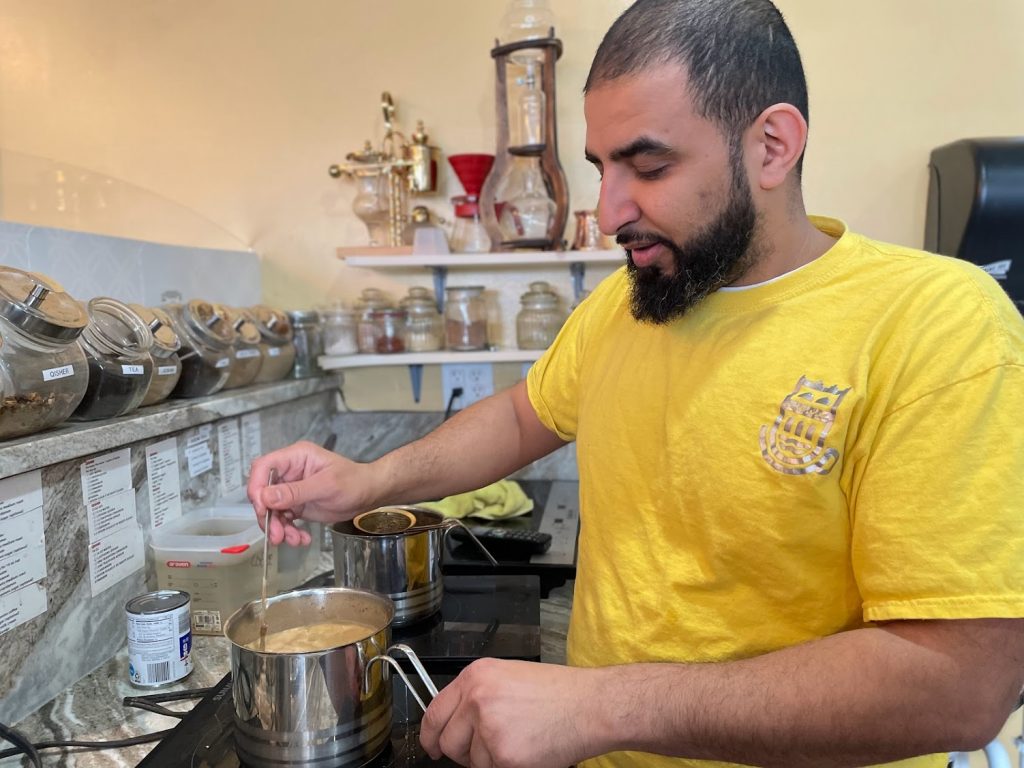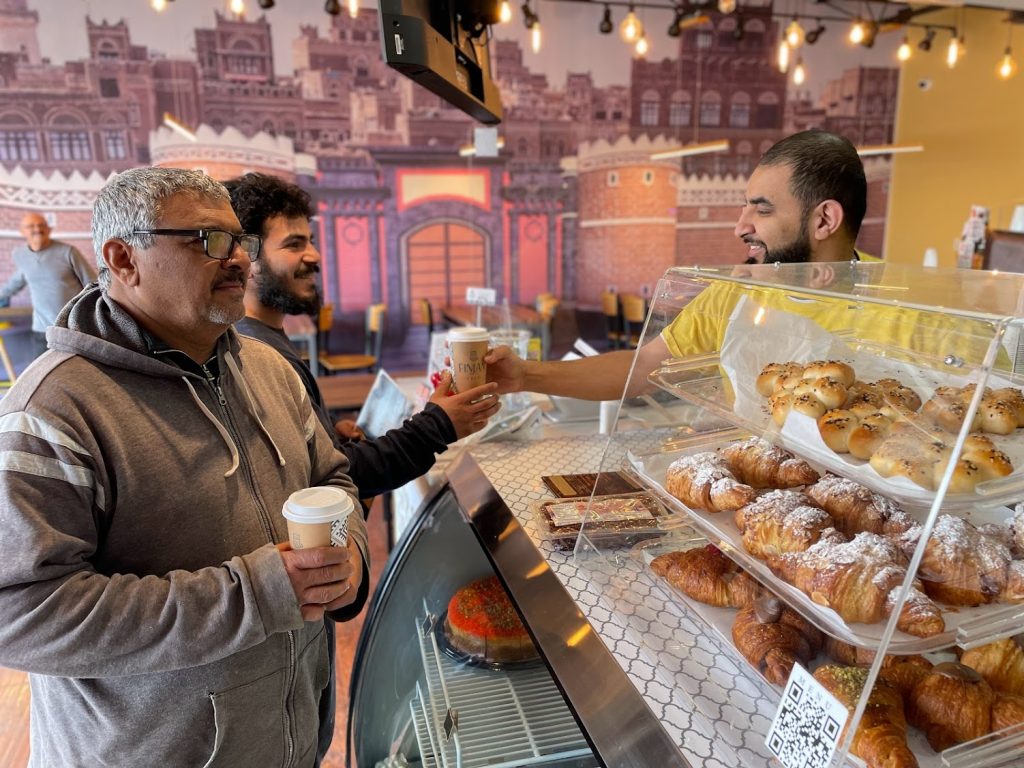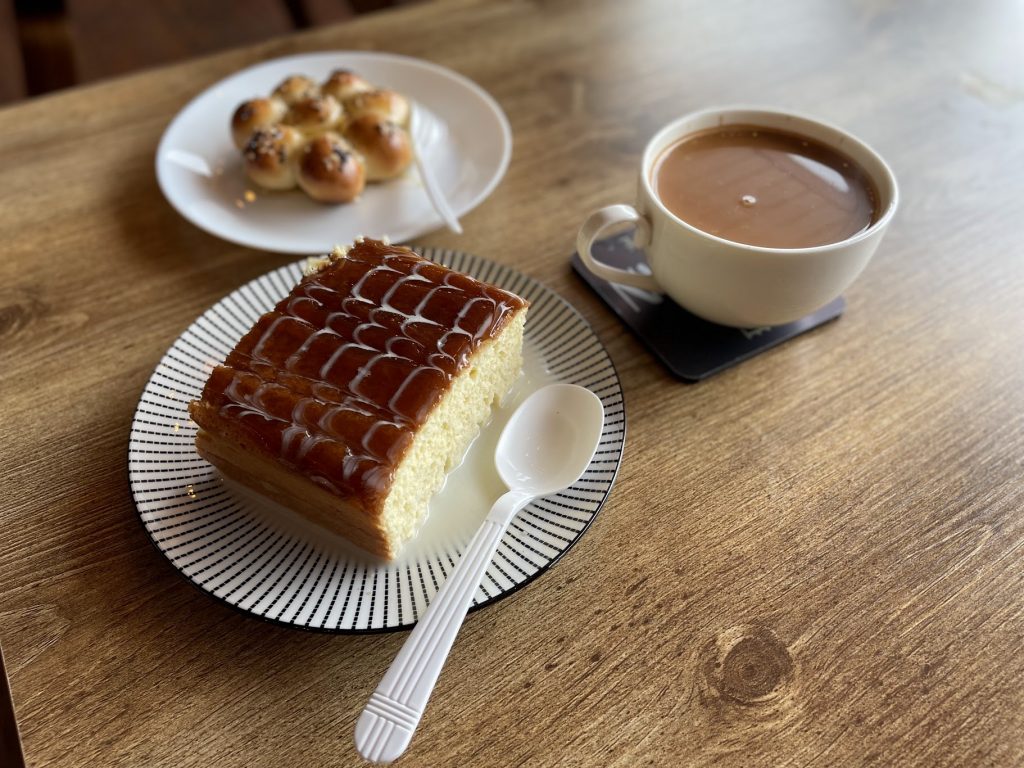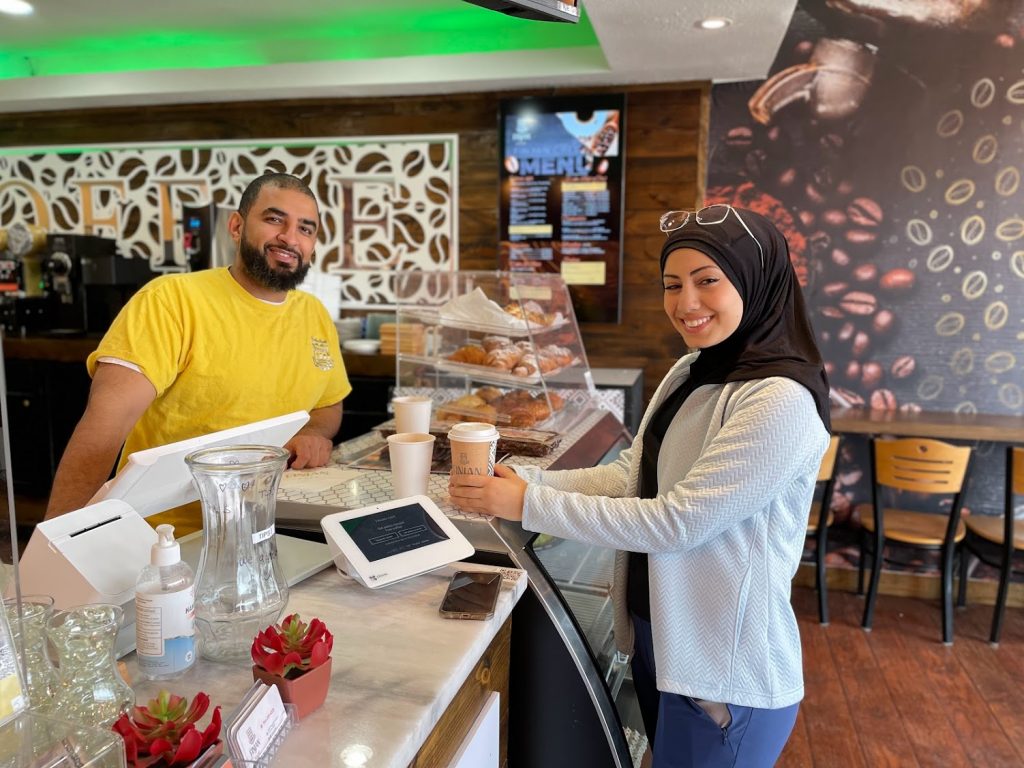Finjan Cafe owner sets out to build a Yemeni legacy

Fares Abdulmalek keeps a close eye on a concoction at Finjan Cafe in Garden City. He decided to lean into one of his dreams of opening a Yemeni shop during the pandemic.
“Communities of Hope” features Detroiters from communities of color who have been looking for ways to persevere during the pandemic.
As the COVID-19 pandemic raged on, Fares Abdulmalek decided he had to find a different way to earn income. He decided to lean into one of his dreams of opening a Yemeni shop called Finjan Cafe in Garden City. His goal was to educate the world about Yemen’s rich coffee history.
Abdulmalek is a 34-year-old Yemeni man with a 5-foot 11-inch frame. He smiles shyly. He stands behind the counter in a bright yellow T-shirt, khakis and black sneakers.
Abdulmalek was born in Yemen, and later moved to the United States with his family. He attended Dearborn schools, then studied radiation therapy and health and nutrition at Wayne State. He worked at Starbucks during his college days.
During a trip to Yemen in 2008, Abdulmalek was looking for a cup of dark roast coffee when he stumbled upon the age-old, traditional ways of cultivating and brewing Yemeni coffee.
“I saw the different kinds of coffee that we didn’t serve at Starbucks.”

Yemen is known as the birthplace of commercial coffee, originating around 1500 A.D. A couple of centuries later coffee beans were being shipped from the Port of Mokha to different parts of the world.
Over the years Abdulmalek brewed the idea of combining his love of coffee with a way to educate Metro Detroiters about Yemeni culture.
Then COVID-19 hit in 2020. At the time he was working as a pediatric cardiology assistant at local hospitals.
“You’re just scared to spread it to your family going home,” he says.
Abdulmalek realized he no longer wanted to work in health care clinics or hospitals. Instead, he thought of safer ways to make income like opening up his dream coffee shop. He took a leap of faith and opened Finjan Cafe in October 2021 while working part time at his day job.
“I was inspired to mix the two cultures and also help Yemeni farmers. So we’re importing coffee from Yemen, and we’re having other cultures try the Yemeni coffee.”
He’s referring to helping farmers who are living through a civil war and famine.

“A very homey feeling” at Finjan Cafe
Abdulmalek says opening the cafe wasn’t easy during the pandemic.
“Couldn’t find workers,” he says, “… just challenging for also me running it going back home or going home have the family get COVID or anything so it’s just like it was hard.”
Eventually, he staffed the café and quit his health care jobs.
The name of the café comes from the Arabic word “finjan” or a small handle-less coffee cup.
“I remembered my dad yelling at me saying go get gave me my finjan qahwa … That means cup of coffee.”
The name stuck.
Malak Dorra of Dearborn Heights recently discovered the cafe with a friend.
“We came here and first impression was the decor is amazing. Very, very homey feeling. And the staff was just absolutely amazing,” she says.

Dorra tells Abdulmalek she needs a strong brew to keep her awake. It’s something other customers do too, describing what they are looking for in caffeine or flavor.
“So far, my favorite is the chai latte. It’s just amazing. But he made this concoction. I don’t know specifically what it’s called. But I think it’s the Yemeni adeni (chai) with a couple of shots of espresso,” she says.
Abdulmalek mostly imports coffee from the Port of Mokha. Recently he purchased land in Yemen and hired a family to plant 4,000 coffee trees. The plants grow in mountain valleys spiraling downward to stagger the rainwater. Plants take about four years to grow and bear fruit twice a year once they start producing bright red berries.
Afterward, the coffee cherries are picked by hand, sorted and peeled. Then they are sun-dried before being shipped in containers to the U.S.
Nagwa Ali is a public school administrator and the president of the nonprofit Promise Relief Organization, dedicated to helping women and orphans in Yemen. She says the group held its first pop-up fundraiser at Finjan Cafe in April.
“The cafes are definitely bringing people together. I’ve met so many new people. It’s just a great thing … to have in the community and teaching load about our culture,” Ali says.
Ali says Yemeni coffee shops are bridging the gap between the public and the Yemeni community, which is often misunderstood or misrepresented.
“Coffee is this common thing that makes everyone happy,” Ali says. “I think that it’s wonderful. I think it’s amazing that they’re popping up everywhere and that recognition is that of a positive nature,” she says.
Ali says the cafes present a unique opportunity to preserve Yemeni culture and heritage through education and investment.
Building a legacy
Inside the cafe, Abdulmalek boils water on a pot on a burner and adds loose tea, spices and milk. And then he watches and waits, keeping a close eye on the concoction so it doesn’t boil over.
He says opening Finjan gave him the opportunity to pursue a legacy.
“You just kind of just keep on working and push forward,” he says. “You know you’re doing it for yourself and you see a result so you’re always happy. Every time you’re tired and you say you work too much, you see the other end, your success in what you’re building for the future, for your family and that’s why keeps you happy.”
For Fares Abdulmalek opening a Yemeni cafe is more than just serving coffee and sweets. It’s about preserving culture and community. He’s found a way to introduce Yemeni heritage to Americans through their love of coffee. Abdulmalek says opening Finjin Cafe is the best of both worlds — providing for his family while doing something he loves — and helping rebuild his childhood homeland in Yemen.
All photos by Nargis Hakim Rahman
Listen: How Fares Abdulmalek is preserving culture and heritage at Finjan Cafe.
Trusted, accurate, up-to-date.
WDET strives to make our journalism accessible to everyone. As a public media institution, we maintain our journalistic integrity through independent support from readers like you. If you value WDET as your source of news, music and conversation, please make a gift today.
